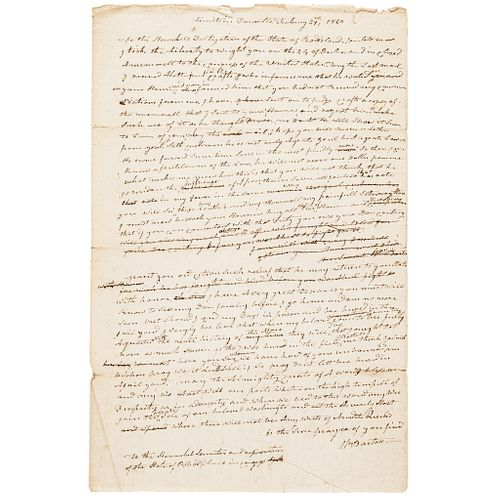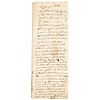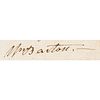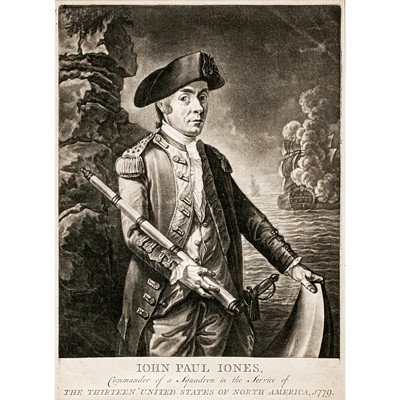WILLIAM BARTON ALS Ponders, (I) will join the Sole of our beloved Washington...
Lot 3
Categories
Estimate:
$1,200 - $1,800
Absentee vs Live bid
Two ways to bid:
- Leave a max absentee bid and the platform will bid on your behalf up to your maximum bid during the live auction.
- Bid live during the auction and your bids will be submitted real-time to the auctioneer.
Bid Increments
| Price | Bid Increment |
|---|---|
| $0 | $10 |
| $200 | $20 |
| $300 | $25 |
| $500 | $50 |
| $1,000 | $100 |
| $2,000 | $200 |
| $3,000 | $250 |
| $5,000 | $500 |
| $10,000 | $1,000 |
| $20,000 | $2,000 |
| $30,000 | $2,500 |
| $50,000 | $5,000 |
| $100,000 | $10,000 |
| $200,000 | $20,000 |
| $300,000 | $25,000 |
| $500,000 | $50,000 |
About Auction
By Early American History Auctions
Jan 23, 2021
Set Reminder
2021-01-23 12:00:00
2021-01-23 12:00:00
America/New_York
Bidsquare
Bidsquare : Early American History Auction of Autographs, Americana, Political & Maps
https://www.bidsquare.com/auctions/early-american-history-auctions/early-american-history-auction-of-autographs-americana-political-maps-6311
311 Lots of Rare, Historic Autographs, Americana, Civil War Era, George Washington, Abraham Lincoln, Slavery & Black History, Revolutionary War Era, Colonial America, Federal Period, War of 1812, Colonial Currency, Indian Peace Medals & more... Early American History Auctions auctions@earlyamerican.com
311 Lots of Rare, Historic Autographs, Americana, Civil War Era, George Washington, Abraham Lincoln, Slavery & Black History, Revolutionary War Era, Colonial America, Federal Period, War of 1812, Colonial Currency, Indian Peace Medals & more... Early American History Auctions auctions@earlyamerican.com
- Lot Description
Autographs
1820 William Barton American Revolutionary War General ALS as Prisoner in Debtor's Jail Danville, VT. Ponders His Death (I) "will join the Sole of our beloved Washington..."
General WILLIAM BARTON (1748-1831). 1775 enlisted in the Continental Army, fought in the Battle of Bunker Hill. In 1777, led a daring raid Capturing British Major General Richard Prescott and was honored with a Presentation Sword by Resolution of the Continental Congress, Member of Society of the Cincinnati.
February 29, 1820-Dated Autograph Letter Signed, "Wm. Barton" at the end of a lengthy personal Letter from the "Limits of Danville [Vermont]" to the "Honorable Senators and Representatives of the State of Rhode Island in Congress", Very Fine. This personal retained copy is apparently Barton's draft, having many integral handmade revisions and corrections. This 1.25-page Letter is on fine period laid paper (no watermark), measuring 12.25" x 8," having some minor fold edge faults but overall well written in crisp brown with nice eye appeal. This is his retained kept copy, written by General Barton by his own hand. That Letter also written contemporaneously while in prison in Danville, Vermont and while pleading to be released. He states that a Judge Crafts will be carrying a copy of his Memorial for them to present to Congress. He hopes that they see fit to release him so that he can see his dear family once again. He also states in his despair ponders his death, that if he should die in jail, he hopes that they will not bury him in jail... and that he hopes to see the likes of (General and President George) Washington once again when he dies. Barton states: (I) "will join the Sole of our beloved Washington...". On the reverse docket side is a long notation on one fold section. Barton states that he has made a gift of the sash he wore in the first war with the Mighty Britains. It is known that Barton kept a personally handwritten copy of every letter he wrote, and he frequently rewrote and sent them if he received no response from the receiving party from the first. Barton spent nearly 13 years of his life in Danville Prison until at the age of 77 he was finally released at the initiative of the visiting Marquis de Lafayette, who agreed to pay the balance of his fine and debt. An exceptional personal content historic William Barton Signed Letter.
William Barton (1748-1831) was an officer in the Continental Army during the American War of Independence who retired with the rank of colonel. He later served as Adjutant General of the Rhode Island militia.
Barton was born in Warren, Rhode Island on May 26, 1748. He worked as a hatter in Providence, Rhode Island. In 1771, he married Rhoda Carver. In 1775, he enlisted in the Continental Army as a corporal. He fought in the Battle of Bunker Hill. In 1777, as a major in the Rhode Island state troops, he planned and led a raid on British headquarters, capturing Major General Richard Prescott. For this exploit, he was promoted to lieutenant colonel and honored by a resolution of the Continental Congress.
When Rhode Island ratified the Constitution of the United States in 1790, Barton was sent to New York to notify George Washington.
In 1781, Barton petitioned the governor of Vermont for a grant of unsettled land near the Canadian border. He was joined in this petition by Ira Allen (brother of Ethan), John Paul Jones, and others. The town of Barton, VT came into existence at this time.Then Col. Barton was jailed over a land dispute. He refused to pay a real estate tax on some land he had sold to a party named Wadhams. This put the title in dispute. Wadhams found out about that, repurchased the land from another man, and then demanded that Barton return his money to him. After several court actions, Barton was ordered to pay the original amount, plus court costs. He refused to do this, insisting he would "go to jail and rot" before paying. In 1812, Barton was imprisoned in Danville for his refusal to pay.
At the age of seventy-seven, he was finally released at the initiative of the visiting Marquis de Lafayette, who agreed to pay the balance of his fine.
Barton died on October 22, with the year of death being given variously as 1831 or 1833. He is buried in the North Burial Ground in Providence, Rhode Island. Fort Barton in Rhode Island was named after William Barton.
- Shipping Info
-
Early American provides in-house worldwide shipping. Please contact us directly if you have questions about your specific shipping requirements.
-
- Buyer's Premium



 EUR
EUR CAD
CAD AUD
AUD GBP
GBP MXN
MXN HKD
HKD CNY
CNY MYR
MYR SEK
SEK SGD
SGD CHF
CHF THB
THB













